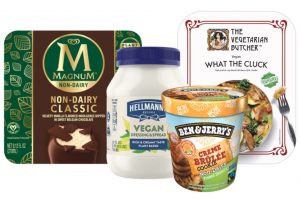Plant-Based Betting: U.K. Giant Unilever Targets Vegan Sales
Vivian Haas
International Business Writer
Unilever, an Anglo-Dutch multinational consumer goods company, has recently announced that they want to increase its annual sales of plant-based meat/dairy products five-fold within seven years. The company plans on hitting a sales revenue of €1 billion ($1.19 billion) by 2027 since there has been increasing demand for vegan and vegetarian food options. Due to increasing customer awareness of the health and environmental benefits of turning vegetarian, Unilever expects vegan food to become a staple in the upcoming years.
Unilever is a consumer goods company that prides themselves on nutritious foods, household care essentials, and products that make a difference. The company makes around 400 brands that are available in over 190 countries. Unilever brands include Lipton, Knorr, Dove, and more, with an annual turnover of more than €1 billion. Their goals include helping more people improve their health and wellbeing, halving the environmental footprint of their products, and sourcing 100% of their agricultural raw materials sustainably. Their new goal of producing and selling more plant-based products, will help them achieve their main goals of improving health and the environment. Unilever believes that with the increased concern about wellbeing and the environment, they will be able to reach their large goal of €1 billion sales.
Not only is being more vegetarian conscious beneficial to one’s health, but it is also beneficial to the environment. Animal agriculture is the second largest contributor to greenhouse gas emissions, especially methane, which is a huge contributor to global warming. According to the Farm Bureau, in 2018 the organization revealed that animal agriculture released about 619 million metric tons of greenhouse gases into the atmosphere. In addition, meat plants are the leading cause of deforestation, water and air pollution, and biodiversity loss. Nearly a third of biodiversity loss to date has been linked to animal agriculture, and nearly 75% of deforestation in the Brazilian Amazon rainforest. Unilever recognizes these negative environmental actions as detrimental to the future of the earth and aims to decrease these greenhouse emissions and pollution through promoting vegetarian food.

In the United Kingdom, vegan food sales have dramatically increased from £488 million ($578.51 million) last year to £577 million ($684.02 million) this year, according to analyst firm Kantar. With more people acknowledging the health benefits of vegetarian food, Unilever expects a large increase of plant-based purchases. Studies have shown that vegetarian diets lower the risk of heart disease and type 2 diabetes, in addition to other health conditions. With the increased awareness of the health and environmental benefits, the Vegan Society conducted a survey that over 600,000 people in the United Kingdom are vegans, and even more people who are vegetarian. With the large growth of vegetarians and vegans over the last few years, Unilever is confident that they will be able to reach their financial goal in 2017.
The high sales goal for plant-based meat and dairy products stems from Unilever’s estimation of the plant-based meat market alone to be worth $35.4 billion by 2027. However, to reach its target, the company will need to have extremely high growth rates to achieve their desired goal. Unilever is planning on the increased vegetarian growth around the world as well as lowering the cost of the plant-based meat. Hanneke Faber, president of Unilever’s food and refreshment business, is confident that the company can lower prices if food production is increased. Scaling up production to make the increasing demand will allow the company to lower the price of plant-based meat and make prices more comparable to meat products.
Unilever is confident that they will be able to reach their sales revenue goal of €1 billion by the year 2027. With the health benefits, decreased chance of heart disease and type 2 diabetes provided by eating less meat, and the environmental benefits, decreased greenhouse gas emissions and pollution, Unilever is expecting a large increase of vegetarian food sales. With plans to increase production and decrease price, the company is hoping their efforts towards plant-based products will not only improve the health condition of people, but also contribute to fighting global warming and other environmental pollution.
Contact Vivian at haasvivi@shu.edu

